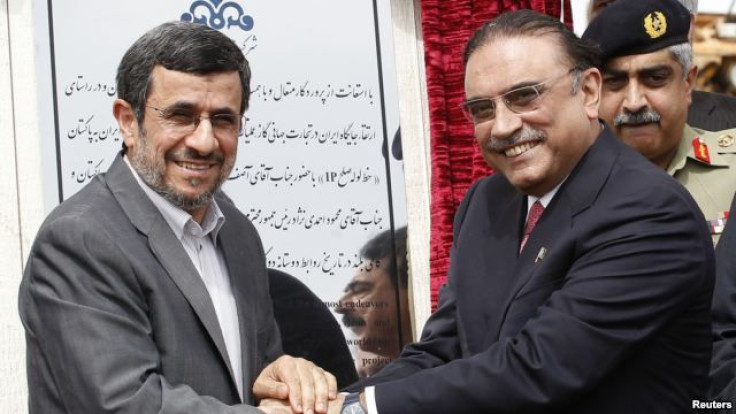Pakistan Launches Iran Gas Pipeline Project On Its Side Of Border, Despite Threats Of US Sanctions

In defiance of U.S. threats of economic sanctions, Pakistan has joined with Iran to break ground on a new gas pipeline on its side of the border between the two neighbors.
At a ceremony in the Iranian border city of Chah Bahar, right across the border from Pakistan’s Baluchistan province, Iranian President Mahmoud Ahmadinejad and his Pakistani counterpart, Asif Ali Zardari, celebrated the commencement of the construction of a 780-kilometer (485-mile) pipeline that will transport Iranian gas to Pakistan.
The project is scheduled to be completed by the end of 2014 – at which time Pakistan would potentially receive 750 million cubic feet of gas per day.
The Iranian portion of the pipeline is almost finished -- now the Pakistani segment of the project formally begins at a cost of some $1.5 billion (one-third of which Iran is providing through a loan to Pakistan).
“The completion of the pipeline is in the interests of peace, security and progress of the two countries. … It will also consolidate the economic, political and security ties of the two nations,” Ahmadinejad and Zardari said in a joint statement.
Zardari called the project “very important” to Pakistan’s energy security, given the country’s chronic power shortages and frequent blackouts.
Meanwhile, Ahmadinejad, referring to existing sanctions by the U.S. and other Western powers on Iran’s oil industry in retaliation for its nuclear program, declared: “This gas pipeline is a … show of resistance against domination. … The Westerners have no right to make any obstacles in the way of the project.”
According to a broadcast of the ceremony by Iranian TV, Ahmadinejad flippantly added: “This pipeline has nothing to do with the nuclear issue. You cannot build a nuclear bomb with natural gas.”
The pipeline will allow Tehran -- already reeling from Western sanctions -- to market gas to Pakistan, a nation hungry for energy.
The ceremony was attended by a large delegation of senior government officials and ministers from both Pakistan and Iran, including former Pakistani Prime Minister Yusuf Raza Gilani, Pakistan’s current Ambassador to the U.S. Sherry Rehman and Pakistani Foreign Minister Hina Rabbani Khar.
Washington is very concerned about Pakistan’s deal with Iran.
Victoria Nuland, a spokesperson for the U.S. State Department, warned last week the gas pipeline “would raise serious concerns under our Iran Sanctions Act.”
“We’ve made that absolutely clear to our Pakistani counterparts. And just to say again that Iran has proven again and again that it is not a reliable partner,” she added.
In recent years, the U.S. government has suggested an alternate source of gas for Pakistan -- Turkmenistan in Central Asia, by way of a pipeline through Afghanistan. That projects remains in the planning stages, while the Iran-Pakistan pipeline was first broached almost 20 years ago.
In response to U.S. warnings, Farhatullah Babar, a spokesman for Zardari, told Pakistan’s English-language daily, Dawn, that the gas pipeline is purely an economic initiative.
“The [Pakistani] government is going to initiate this important project in view of [our] energy requirements. The project will bring economic prosperity, provide better opportunities to the people,” he said.
A spokesman for the Pakistani foreign office had earlier said that as an energy-deficient country, Pakistan is “hugely suffering both economically and socially. … It is in our national interest to go ahead with this project.”
Last year, Pakistan’s Foreign Minister Khar emphasized that the pipeline was "in Pakistan's national interest" and would not be curtailed by "any extraneous considerations" (an apparent dig at Washington).
India, which was originally involved in the project, withdrew in 2009, citing costs and security issues – and right after New Delhi signed a nuclear deal with the U.S.
Mike Woolridge, a BBC correspondent in Islamabad, noted that the gas pipeline is of extreme important to Pakistan on a number of fronts.
“Power blackouts are increasing, demand for electricity and gas rises all the time -- and the government is under consistent domestic pressure to find a solution,” he wrote.
However, Voice of America reported that completion of the pipeline is still a long way off – among other things, it is not clear how Pakistan will pay for the remaining $1 billion in costs related to the pipeline construction within its borders. In addition, Baluchistan province, where the Pakistani segment of the pipeline will commence, is highly volatile, featuring a violent separatist movement that will likely seek to sabotage the project for its own purposes.
© Copyright IBTimes 2024. All rights reserved.











